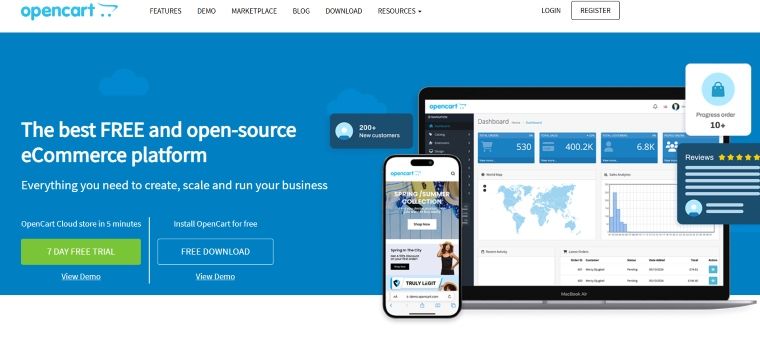Top WooCommerce Alternatives of 2025

The e-commerce landscape is becoming more competitive and fast-paced every year. For businesses, selecting the right platform to build and manage their online store is critical to long-term success. WooCommerce has long been one of the most popular options, particularly for WordPress users, due to its versatility and the rich ecosystem of plugins and themes that allow extensive customization.
However, WooCommerce may not always be the ideal solution for everyone. Its reliance on WordPress, the need for separate hosting, and the complexity of managing a self-hosted store can make it a less attractive option for businesses looking for simplicity or scalability. In 2025, a wide range of e-commerce platforms provide alternatives to WooCommerce, offering diverse features, better scalability, or more user-friendly interfaces.
The Best WooCommerce Alternatives of 2025

|
Manage Multiple Stores In One Account Multiple Stores Management - Link and manage multiple stores on different platforms in one place |
The best WooCommerce alternatives of 2025 provide robust e-commerce solutions for businesses of all sizes. Whether you seek ease of use, advanced features, or lower costs, the following platforms are excellent choices:
1. Shopify

Shopify has become one of the most widely recognized e-commerce platforms globally, particularly for its ease of use and powerful built-in features. Unlike WooCommerce, Shopify is a fully hosted solution, meaning users don’t need to worry about managing hosting, security, or updates. Shopify handles all the technical aspects, allowing store owners to focus purely on their business operations and growth.
One of Shopify’s standout features is its comprehensive app marketplace, which offers thousands of apps and integrations to extend the platform’s functionality. From marketing automation to inventory management, there is an app for virtually every need. Shopify also provides a rich selection of free and premium themes, ensuring that even those without design skills can build a professional-looking store.
Key Features:
- Fully hosted platform, eliminating the need for separate hosting.
- Extensive app ecosystem with thousands of integrations to enhance functionality.
- A wide variety of free and premium themes to tailor the store’s appearance.
- Built-in tools for SEO, abandoned cart recovery, and multi-channel selling.
- Access to Shopify Payments for seamless transaction processing.
Businesses of all sizes benefit from Shopify, whether startups or established brands. The platform proves especially useful for those who want to concentrate on business growth without technical challenges. While it allows customization, its user-friendly interface makes it accessible to users with minimal experience.
2. BigCommerce

BigCommerce is another leading fully hosted e-commerce platform that has gained a strong reputation for its scalability and feature-rich platform. Like Shopify, BigCommerce provides an all-in-one solution for online stores but focuses more on mid-sized to enterprise-level businesses. It’s known for offering advanced features like multi-channel selling, in-depth SEO tools, and robust API support right out of the box.
One of BigCommerce’s most attractive features is the lack of transaction fees, regardless of the payment gateway used, making it a cost-effective option for high-volume sellers. Additionally, BigCommerce offers a range of built-in tools, such as product review systems, bulk pricing, and discount management, reducing the need for additional apps or plugins.
Key Features:
- Support for selling across multiple platforms such as Amazon, eBay, Facebook, and Instagram.
- Flexible API integrations for seamless connection with various third-party systems.
- No transaction fees, regardless of the pricing plan.
- Customizable with access to over 65 payment gateways and currency options.
- Advanced SEO tools to improve search engine rankings.
BigCommerce serves businesses that have ambitious growth plans and require advanced e-commerce features. Companies experiencing high sales volumes or seeking to expand into omnichannel selling will benefit from the platform’s extensive tools.
3. Magento (Adobe Commerce)

Magento, now part of Adobe Commerce, is known for being one of the most powerful and flexible e-commerce platforms on the market. Unlike Shopify or BigCommerce, Magento is an open-source solution, offering businesses complete control over their online store. However, this flexibility comes with increased complexity, as Magento requires technical expertise or a dedicated development team to manage effectively.
Magento excels in handling large-scale operations, offering the ability to manage multiple stores from one dashboard, handle complex product catalogs, and implement custom pricing rules. Its scalability and flexibility make it one of the best choices for large enterprises looking for tailored solutions. Magento’s open-source nature also means there is a vast community of developers available to provide support and custom development.
Key Features:
- Complete control over the design, functionality, and features of the store.
- Multi-store support, suited for international businesses.
- Advanced tools for managing large catalogs, complex products, and pricing rules.
- Highly scalable for businesses with high traffic and sales volume.
- A vast community of developers providing support and custom development.
Magento serves large enterprises or businesses in need of complete flexibility. While the platform is customizable, technical expertise is required, either in-house or outsourced. The open-source version is free, but companies often invest in development and hosting costs.
4. Squarespace

Squarespace has long been known as a platform for creatives, offering visually stunning designs and an intuitive website builder. In recent years, Squarespace has expanded its e-commerce functionality, making it a viable alternative to WooCommerce for small to medium-sized businesses.
One of Squarespace’s main strengths is its design-focused approach, with a wide range of professional templates that are mobile-optimized and customizable. Its drag-and-drop editor makes it easy for anyone to create a beautiful, functional online store without needing technical skills.
Key Features:
- Professional design templates.
- Intuitive drag-and-drop builder with no coding required.
- Built-in e-commerce tools for inventory management, order processing, and product cataloging.
- Integration with major shipping services like USPS and FedEx.
- Analytics tools to monitor sales performance and customer behavior.
Squarespace is particularly well-suited for small to medium-sized businesses that prioritize visually stunning online stores. Creative professionals, boutique shops, and service-based businesses find the platform's ease of use appealing.
5. Ecwid

Ecwid offers a unique solution for businesses that already have a website and want to add e-commerce functionality without rebuilding their entire site. Ecwid integrates with platforms like WordPress, Wix, Joomla, and Weebly, enabling users to add an online store to an existing website in just a few steps.
Ecwid’s flexibility extends to multi-channel selling, allowing businesses to sync their products with Facebook, Instagram, and Amazon. It provides a straightforward and budget-friendly option for small businesses looking to expand their online presence without investing heavily in a new e-commerce platform.
Key Features:
- Seamless integration with platforms such as WordPress, Wix, Weebly, and Joomla.
- Quick setup with minimal technical skills required.
- Multi-channel selling across Facebook, Instagram, and Amazon.
- Support for over 40 payment gateways and automatic tax calculations.
- Affordable options for small businesses.
Small businesses or those with existing websites that want to add e-commerce capabilities benefit from Ecwid. The platform is also ideal for selling across multiple channels without the complexity of managing separate platforms.
6. Wix eCommerce

Wix has transitioned from being a simple website builder into a fully-fledged e-commerce platform over the past few years. With its easy-to-use drag-and-drop editor, Wix provides a user-friendly solution for small businesses and entrepreneurs looking to build a professional online store without needing technical skills.
Wix offers a variety of e-commerce features, including inventory management, product options, and payment gateway integration. While not as advanced as platforms like Shopify or BigCommerce, Wix covers the essentials for running a small online store and has a growing app marketplace for added functionality.
Key Features:
- Intuitive drag-and-drop builder with over 500 customizable templates.
- Built-in SEO tools and analytics for traffic and sales tracking.
- Integration with major payment gateways such as PayPal and Stripe.
- Tools for managing inventory, product displays, and shipping.
- Access to a large app marketplace for extended functionality.
Wix eCommerce suits small to medium-sized businesses that value ease of use and customizable design options. Entrepreneurs just starting out also find the platform affordable and accessible.
7. PrestaShop

PrestaShop is an open-source e-commerce platform that offers businesses a highly customizable solution for building and managing online stores. Unlike fully hosted solutions like Shopify or BigCommerce, PrestaShop gives users full control over their store’s design and functionality, which can be both an advantage and a challenge. Businesses can host their PrestaShop store on any server of their choice and modify the code to meet their specific needs.
PrestaShop stands out because of its large selection of modules and themes, enabling businesses to extend their store's functionality. While it requires some technical expertise for setup and ongoing maintenance, PrestaShop is particularly favored by businesses that want a feature-rich platform without the restrictions of a hosted solution.
Key Features:
- Open-source platform providing complete flexibility and control.
- A large marketplace of themes and modules to extend functionality.
- Support for international sales with multi-language and multi-currency options.
- Advanced inventory management tools.
- Strong community of developers for custom solutions and support.
Businesses with technical expertise or access to developers benefit from PrestaShop’s flexibility. It proves valuable for those seeking a scalable, customizable solution outside of a traditional CMS platform.
8. OpenCart

OpenCart is another open-source e-commerce platform that offers a simple yet powerful solution for building and managing online stores. OpenCart is designed to be lightweight and easy to use, even for those without extensive technical knowledge, while still offering a high degree of customization through extensions and themes.
OpenCart’s marketplace offers thousands of extensions, ranging from payment gateways and shipping integrations to marketing tools and analytics. One of OpenCart’s strengths lies in its multi-store functionality, allowing users to manage multiple stores from a single interface. This makes it a popular choice for businesses operating in different regions or offering various brands under one umbrella.
Key Features:
- Free, open-source software with a lightweight, fast interface.
- Extensive library of extensions and themes for customization.
- Multi-store support, allowing management of multiple stores from a single dashboard.
- Integration with various payment gateways and shipping methods.
- Active community and developer support for troubleshooting and enhancements.
Small businesses or startups seeking a cost-effective, straightforward solution benefit from OpenCart. The platform also suits those with technical knowledge or access to developers for customization.
How to Choose the Best WooCommerce Alternative
When selecting the most suitable WooCommerce alternative, several factors influence the decision:
- Ease of Use
Platforms such as Shopify, Squarespace, and Wix offer user-friendly interfaces that require minimal technical knowledge, making them accessible to beginners. - Scalability
For businesses experiencing rapid growth, platforms such as BigCommerce or Magento provide robust tools and features for handling high traffic, large product catalogs, and complex operations. - Customization
Open-source platforms like PrestaShop and OpenCart allow extensive customization, providing control over the online store for those with technical expertise. - Pricing
While platforms like Shopify and BigCommerce come with subscription fees, open-source platforms such as PrestaShop and OpenCart offer free access but may require investments in hosting, security, and customization. - Support & Security
Consider platforms offering strong customer support and security features. Hosted platforms such as Shopify and BigCommerce handle security updates, whereas open-source solutions leave this responsibility with the business. - Integration
It is essential to ensure compatibility with necessary tools like payment gateways, shipping providers, and marketing tools. Shopify and BigCommerce provide broad app ecosystems, while open-source platforms may require custom development.
Conclusion
In 2025, businesses have a wide array of WooCommerce alternatives that cater to various needs, whether they prioritize ease of use, scalability, or customization. Each platform offers unique features that can align with the specific goals and challenges of e-commerce businesses.
By carefully evaluating factors such as user-friendliness, scalability, customization options, pricing models, and integration capabilities, businesses can identify the most suitable alternative to WooCommerce. Whether starting a new venture or scaling an existing business, finding the right platform in 2025 ensures a strong foundation for e-commerce success.
Learn more about dropshipping or e-commerce, explore DSers now.









 Company
Company
 Why Choose DSers
Why Choose DSers
 Blog
Blog
 Help Center
Help Center




 Live Chat
Live Chat